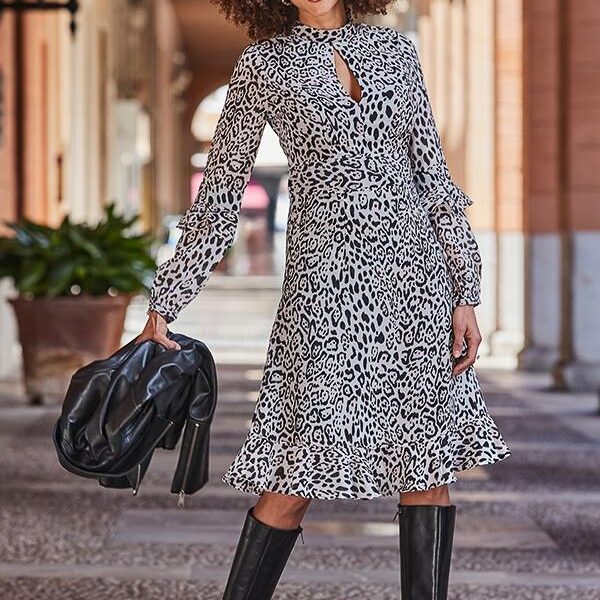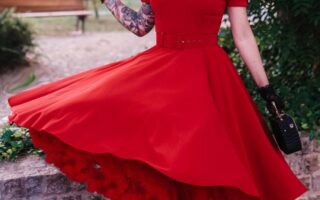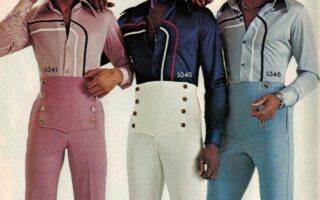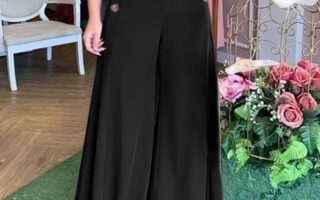In a world where self-expression intertwines with the ever-evolving threads of fashion, contemporary women’s clothing stands as a vibrant tapestry reflecting not only personal style but also societal shifts. Gone are the days when fashion was merely about following trends; today, it encompasses a rich dialogue about identity, empowerment, and sustainability. From the catwalks of urban metropolises to the everyday wardrobes of women around the globe, contemporary fashion offers a diverse array of garments that embrace versatility and comfort without sacrificing elegance. This article delves into the dynamic landscape of modern women’s fashion, exploring key trends, influential designers, and the cultural narratives woven into the fabric of contemporary attire. Join us as we uncover the ways in which today’s clothing not only adorns the body but also celebrates the multifaceted nature of womanhood.
Table of Contents
- Exploring Sustainable Fabrics in Modern Womens Fashion
- The Rise of Versatile Athleisure for Everyday Wear
- Embracing Size Inclusivity in Contemporary Style
- Trends in Seasonal Color Palettes for Women’s Wardrobes
- Q&A
- Key Takeaways
Exploring Sustainable Fabrics in Modern Womens Fashion
In recent years, the fashion industry has witnessed a groundbreaking shift towards eco-consciousness, with designers increasingly embracing materials that reduce environmental impact while enhancing style. Fabrics made from organic cotton, hemp, and Tencel offer sustainable alternatives to traditional textiles, blending luxury with responsibility. These materials not only minimize the use of harmful pesticides but also promote better labor practices, showcasing a commitment to ethical production in contemporary design. Many brands are now favoring biodegradable options, ensuring that their garments tread lightly on the planet without compromising on aesthetics.
What’s more, innovative approaches such as recycling plastic into fabric have gained traction, transforming waste into wearable art. This movement has led to the rise of brands that champion upcycled materials, creating unique pieces that tell a story of sustainability. Here are some examples of sustainable fabrics making waves in modern women’s fashion:
- Organic Cotton: Grown without synthetic chemicals, it offers softness and breathability.
- Hemp: Known for its strength and durability, hemp requires minimal water and pesticides.
- Tencel: Made from wood pulp, this fabric is biodegradable and has a luxurious feel.
- Recycled Polyester: Created from post-consumer plastic bottles, it diverts waste from landfills.
The Rise of Versatile Athleisure for Everyday Wear
As the boundaries between comfort and style continue to blur, women’s fashion is experiencing a momentous shift. Versatile athleisure has emerged as a wardrobe staple, seamlessly transitioning from the gym to brunch dates, and even to more formal settings with the right accessories. Key pieces include soft joggers, chic leggings, and oversized hoodies; their adaptability means women can mix and match these items effortlessly to create numerous looks. Designers are now embracing innovative fabrics that enhance breathability, stretch, and moisture-wicking properties, making choices not only fashionable but functional. This evolution reflects a broader cultural shift towards prioritizing comfort without sacrificing aesthetics.
The emphasis on versatility has given rise to a host of styles and trends within the athleisure category, catering to different personal tastes and lifestyles. Consider these elements that are captivating consumers:
- Layering Techniques: Combining athletic tops with casual blazers or lightweight scarves.
- Bold Colors and Patterns: Vibrant prints that stand out yet offer ease of wear.
- Fashionable Footwear: Sneakers that serve both functional and style roles.
To illustrate the current favorites in athleisure, here’s a simple breakdown of popular pieces:
| Item | Functionality | Style Factor |
|---|---|---|
| High-Waisted Leggings | Supportive during workouts | Sleek and flattering fit |
| Cropped Sweatshirts | Ideal for layering | Trendy and youthful |
| Mesh Panel Tanks | Enhanced breathability | Chic athletic look |
Embracing Size Inclusivity in Contemporary Style
In today’s fashion landscape, the shift towards size inclusivity has paved the way for contemporary women’s clothing that caters to a diverse array of body types, moving beyond traditional sizing barriers. Designers are now embracing a philosophy that celebrates all shapes and sizes, allowing for greater expression of personal style. With collections that feature versatile pieces, women are given the freedom to redefine their wardrobes without the constraints of conventional sizing. This revolution encourages a rich tapestry of styles—from minimalist chic to bold patterns—that resonate with every individual.
Key elements that define size-inclusive contemporary fashion include:
- Flexibility: Tailored cuts that adapt to different body shapes enhance fit and comfort.
- Accessible Fashion: Brands are prioritizing a wider range of sizes, making trendy designs available for everyone.
- Diverse Representation: Increased visibility of models of all sizes in marketing campaigns fosters body positivity and confidence.
- Sustainable Options: Ethical practices in production cater to consumers who value both style and sustainability.
| Fashion Element | Description |
|---|---|
| Comfort | Soft fabrics that allow for breathability and ease of movement. |
| Versatility | Pieces that can be styled for various occasions—from casual to formal. |
| Layering | Designs that enable layering to create unique looks while providing warmth. |
| Statement Pieces | Bold colors and patterns that make a statement while celebrating individuality. |
Trends in Seasonal Color Palettes for Women’s Wardrobes
The evolution of seasonal color palettes in women’s wardrobes has become a captivating journey of self-expression through fashion. As we move into the warmer months, colors are shifting towards vibrant hues that evoke a sense of warmth and joy. Expect to see a rise in coral pinks, sunshine yellows, and turquoise blues, which reflect a playful interaction between nature and personal flair. This season, mixing and matching tones is highly encouraged, allowing each woman to curate a look that resonates with her individuality. Incorporating shades like soft lilacs and fresh greens can create stunning contrasts that reflect a fresh perspective.
In addition to bold statements, earthy tones continue to hold their ground, acting as a grounding force in contemporary fashion. Think of terracotta, olive greens, and neutral beiges that provide versatility and easy layering options. With an increasing emphasis on sustainability, many brands are also crafting collections based on eco-friendly fabrics dyed in these trending colors. This season’s palette beautifully marries aesthetic charm with environmental consciousness, making it easier for stylish women to choose pieces that resonate with both their fashion sense and ethical values. Here’s a quick overview of trending colors for this season:
| Color Family | Key Colors | Suggested Fabrics |
|---|---|---|
| Warm Tones | Coral, Yellow, Terracotta | Cotton, Linen |
| Cool Tones | Turquoise, Lilac, Olive Green | Silk, Tencel |
| Neutral Tones | Beiges, Soft Grays | Modal, Bamboo |
Q&A
Q&A: Exploring Contemporary Women’s Clothing
Q1: What defines contemporary women’s clothing?
A1: Contemporary women’s clothing embodies the essence of modern fashion, characterized by stylish and sophisticated designs that cater to the tastes and preferences of today’s women. It often merges current trends with timeless pieces, promoting versatility and comfort. This genre is not confined to the latest runway styles; instead, it draws inspiration from various influences, including art, culture, and technology.
Q2: How does contemporary clothing differ from fast fashion?
A2: While fast fashion focuses on producing trendy items quickly and affordably, contemporary clothing prioritizes quality and longevity. Contemporary brands tend to invest in better materials and craftsmanship, aiming for a balance between style and sustainability. This results in pieces that not only reflect current trends but are also designed to stand the test of time, both in terms of durability and style relevance.
Q3: What are some key trends in contemporary women’s clothing right now?
A3: Current trends in contemporary women’s clothing include oversized silhouettes, tailored pieces, and gender-fluid styles. Earthy tones and muted palettes are making waves, alongside vibrant prints and textured fabrics that add depth to outfits. Sustainability is also trending, with many brands adopting eco-friendly practices and fabrics, like organic cotton and recycled materials, appealing to the environmentally conscious consumer.
Q4: Who are some prominent brands in the contemporary women’s clothing space?
A4: Several brands have made a significant mark in the contemporary women’s clothing arena. Notable names include Reiss, A.P.C., AllSaints, and Sass & Bide, each known for their unique aesthetic and commitment to quality. Additionally, many emerging designers are carving out their niches by merging innovative designs with ethical production practices, contributing to a diverse and vibrant market.
Q5: What advice would you give to someone looking to integrate contemporary clothing into their wardrobe?
A5: Start by assessing your personal style and considering what pieces resonate with you. Invest in versatile staples, such as well-cut blazers, classic denim, and high-quality basics that can be mixed and matched to create various looks. Don’t shy away from experimenting with layers, textures, and accessories. Lastly, consider sourcing from brands that align with your values, especially those prioritizing responsible production and sustainability.
Q6: How can contemporary women’s clothing enhance personal expression?
A6: Contemporary women’s clothing offers an expansive canvas for self-expression. With its blend of current trends and classic silhouettes, it allows individuals to curate outfits that reflect their unique personalities. By playing with color, layering, and style variations, women can manifest their moods and creativity, breaking free from traditional fashion norms and embracing a more personal, authentic approach to dressing.
Q7: What role do social media and influencers play in shaping contemporary women’s fashion?
A7: Social media and influencers play a pivotal role in shaping contemporary women’s fashion by promoting trends and brands directly to consumers. Platforms like Instagram and TikTok allow for real-time engagement and feedback, enabling a more democratic form of fashion dissemination. Influencers often bridge the gap between high fashion and everyday wear, demonstrating how contemporary pieces can fit seamlessly into various lifestyles and encouraging followers to embrace their own style journeys.
With this Q&A, we hope to illuminate the vibrant world of contemporary women’s clothing, showcasing its capacity for style, quality, and individual expression. Whether you’re a seasoned fashionista or just beginning to explore your style, there’s a landscape of possibilities waiting to be discovered!
Key Takeaways
As we navigate the vibrant landscape of contemporary women’s clothing, it becomes clear that fashion transcends mere fabric and thread. It is a powerful form of self-expression, an intersection of culture, technology, and individuality that reflects the diverse narratives of today’s women. From bold prints to sustainable fabrics, the choices available are not just about aesthetics; they embody values, stories, and aspirations.
As we embrace the fluidity of modern fashion, let us celebrate the creativity that flourishes within this realm. Each garment tells a story of its own, inviting women to weave their identities through the art of dressing. Going forward, may we continue to honor the innovation and inclusivity that characterize contemporary styles, encouraging all women to find empowerment in their wardrobe choices. After all, in the ever-evolving tapestry of fashion, every stitch counts.



